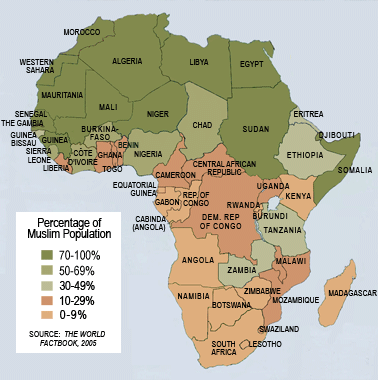I’m sitting in on the “Online Extremism – And the Muslims Who Fight It” panel at SXSW. It’s both interesting and relevant to anyone within the web space in Africa. If you don’t think so, check out the map below:

[reference and more stats from USIP]
When I talk about “Africa”, I tend to paint with a broad brush. After all, what I’m really doing is generalizing, and mashing together, 54 separate nations – as ridiculous as that sounds. However, that’s not really true either. I tend to talk about “Africa” as sub-Saharan Africa, and gloss over nations like Tunisia, Egypt and Libya. In reality, when I (or any of us) talk about mobile phones, blogs, social networks and the web in general I should be including the whole continent.
Okay, so today the session is discussing how to deal with Muslim extremism on the web. Mohammed Suleiman Khan discusses some of the difficulties that they’ve had with their Muslim blog network Hadithuna.
“It’s not the websites. Those are static. The real action is in the chat rooms.”
– Frank Cilluffo Dir. Homeland Security Policy Institute
It’s an interesting talk, primarily because it’s an issue that affects everyone, no matter if you’re in Kenya, South Africa or Egypt. What are the repercussions if you operate a website that starts to attract “fringe” elements (be they Muslim or otherwise)? What policies should you have in place so that you’re not caught napping?
Another uncomfortable question arises when you start thinking about “fringe” groups is whether they’re on the fringe for political reasons, and whether or not that is actually bad? For instance, would you consider a minority group in Zimbabwe fringe because they want to oust Mugabe? The government might call them radicals, but who else would?
“It’s tough to monitor text and pictures, I wouldn’t even know where to begin with video.” Khan, in response to a lady from Seesmic asking what they need to be doing to be ready to handle this type of extremism on a dynamic platform. “I would suggest you harness the other users of the service.”
Lastly, there seems to be a few areas where the Muslims in Africa are further ahead than the rest of the continent. Tunisia has one of the largest blogging groups in Africa (I think somewhere around 28,000). North African countries tend to have greater bandwidth and therefore more apt to use social networks, and tools like YouTube and blog platforms. Across the Muslim communities there is widespread use of forums and chat rooms. What can we learn from them and apply to sub-Saharan Africa?
March 9, 2008 at 12:34 am
wow. I wonder if SXSW has a recorded stream of this in either audio or video that they plan to share. I would have loved to have been there for this discussion.